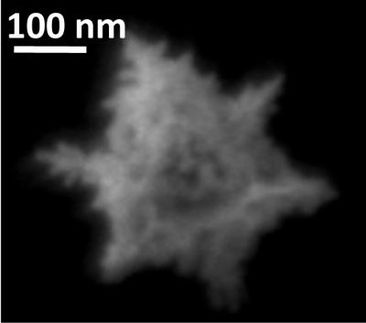ERC advanced grant for Professor Zandbergen's 'nanolaboratory'
Henny Zandbergen, professor at the Kavli Institute of NanoScience, has been awarded an ERC Advanced Grant of 2.5 million euros for his research into improved microscopic technologies. The technologies enable Professor Zandbergen to visualise extremely small structures, such as semiconductor nanowires, all the way down to atomic level. What is especially remarkable is that the structures that are made visible in this way can be measured at the same time. The ERC Advanced Grant is awarded by the EU to scientists of exceptional standing.
Nanolaboratory
Modern microscopic technologies allow researchers to visualise changes to materials at atomic level in real-time. "Currently, the most important technology in this area is High-Resolution Transmission Electron Microscopy (HRTEM)," says Henny Zandbergen.
The technique for which Zandbergen made his ERC Advanced Grant proposal adds a unique extra element to HRTEM. It is a combination of electron microscopy at atomic level and physical measurements (of electrical characteristics in particular). Measurements can be made at the same time as visualisation occurs, so researchers are able to measure straight away what they are making visible on an atomic scale through the electron microscope. "As a result, we can use HRTEM as a kind of nanolaboratory," explains Professor Zandbergen.
NEMinTEM
"My group at the Kavli Institute of Nanoscience in Delft wants to use the ERC Advanced Grant to develop equipment and methods for carrying out nanoelectrical measurements, such as electrical resistance, in HRTEM. These 'NanoElectrical Measurements in a Transmission Electron Microscope' (NEMinTEM) will be applied to various nanostructures, such as semiconductor nanowires, graphene and metal nanoelectrodes."
"In addition, we would like to make some minor modifications to nanostructures of this kind, using the electron beam of the electron microscope," continues Zandbergen. "We can then immediately measure the effect of these modifications on the electrical characteristics of the material."
Most read news
Topics
Organizations

Get the analytics and lab tech industry in your inbox
By submitting this form you agree that LUMITOS AG will send you the newsletter(s) selected above by email. Your data will not be passed on to third parties. Your data will be stored and processed in accordance with our data protection regulations. LUMITOS may contact you by email for the purpose of advertising or market and opinion surveys. You can revoke your consent at any time without giving reasons to LUMITOS AG, Ernst-Augustin-Str. 2, 12489 Berlin, Germany or by e-mail at revoke@lumitos.com with effect for the future. In addition, each email contains a link to unsubscribe from the corresponding newsletter.























































